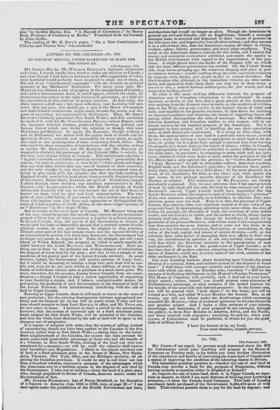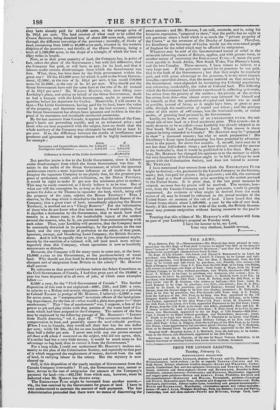No. VIII. 18th February 1831.
MY LORD—I am urged, by persons much interested about the Bill for Colonization which your Lordship will propose to the House of Commons on Tuesday next, to lay before you some further illustration of the expediency and facility of convertingthe waste land of Canada into a means of improving the condition of the labouring classes in Britain.
The immediate practical question is—whether the sale of new land in Canada may provide a fund for the purposes of Emigration, without having recourse to taxation either in England or Ireland ?
As respects the sale of waste land, there is in Upper Canada an snipe. Titan in imperio, to which I am most desirous of drawing your Lordship's attention,—I mean the Canada Land Company. This body of London merchants lately purchased of the Government 2,484,413 acres of wild land. Their contract permits them to pay for the land by degrees ; and they have already paid for 415,000 acres, at the average price of 2s. 101d. per acre. The land consists of what used to be called the Crown Reserves being detached lots of about 200 acres each, scattered through the different townships of the province ; secondly, of blocks of Land, containing from 1000 to 40,000 acres each, situated in the western diStricts of the province ; and thirdly, of the Huron Territory, being a tract of 1,100,000 acres, in the shape of a triangle, of which the base is allay miles in length: Now, as to that great quantity of land, the Company has, in point of fact, taken the place of the Government ; but with this difference, that • the Company has paid, or will have to pay, for its land, and that it labours under certain disadvantages from which the Government was free. What, then, has been done by the little government within the great one ? Of the 415,000 acres for which it paid to the Great Govern- ment, 57,5004, at the rate of 2s. 10d. per acre, it has resold 110,000 acres for 51,6001., at the rate of 9s. 4d. per acre. Why should not the Great Government have sold the same land at the rate of 9s. 4d. instead of 2s. lOid. per acre ? Mr. WiLszoT Hoar" who, then filling your Lordship's place, and acting on behalf of the Great Government, made so bad a bargain with the Little Government, ought to answer that question before his departure for Ceylon. Meanwhile, I will answer it, thus—The Little Government, having paid for its land, knew the value of the property, and therefore turned it to the best account ; whereas the Great Government has always been ignorant and reckless in the dis- posal of its enormous and invaluable territorial possessions.
By the last accounts from Canada, it appears that the sales of the Com- pany's lands are proceeding rapidly, and at an enhanced price ; and those who are best acquainted with the subject, have no doubt that the whole territory of the Company may ultimately be resold for at least U. per acre. If so, the difference between the results of intelligence and prudence and ignorance and improvidence will be highly instructive— for example :
Acres.
Ignorance and Improvidence obtain, for 2,484,413 .... 482,134 Intelligence and Prudence 2.484,413 .... 2,464,413 Difference in favour of the Little Government £2,002,279
But peculiar praise is due to the Little Government, since it labours ander disadvantages from which the Great Government was free. It exists in the midst of the Great Government, of which the ignorant recklessness exerts a most injurious influence on all traders in land. Imagine the sagacious Company to see plainly that, for the greatest pro- gress of settlement, wealth, and civilization, on the Huron Territory, it would be right to make 1/. per acre the minimum price to settlers. This may be easily conceived, as I firmly believe it to be true. But of what use will the conception he, so long as the Great Government shall permit Sir John or Sir Thomas to squander the land, which, being still the property of the state, adjoins the Huron Territory ? Then I observe, by the map which is attached to the last published Report of the Company, that a great tract of land, immediately adjoining the Huron Territory, is marked out as a "Clergy Reserve." For the information of those who do not know what that term means, I would explain, that it signifies a declaration by the Government, that so much land shall remain in a desert state, to the incalculable injury of the settlers around the reserve, who, by it, are prevented from communicating with each other. Thus, your Lordship will perceive, that the Company must be constantly thwarted in its proceedings, by the profusion on the one band, and the Very opposite of profusion on the other, of that great, ignorant, corrupt, and blundering Land Company, the British Govern- ment. And it will be equally clear to you, that the Government might, merely by the exertion of a rational will, sell land much more advan- tageously than this Company, whose operations it now so hurtfully counteracts or disturbs.
However, the Company will for many years to come pay, at the least, 19,000/. a year to the Government, as the purchase-money of waste land. Why should not that fund be devoted to defraying the cost of the cheapest sort of emigration from Britain to. the colony ? Mr. HORTON shall answer.
By reference to that person's evidence before the Select Committee on the Civil Government of Canada, I find that great part of the 19,000/. a year has been disposed of in all sorts of jobs, of which some examples follow :-
8,500!. a year, for the "Civil Government of Canada." The further disposition of this sum is not explained-4001., 750/., and 750/. a year, in salaries to a Bishop and certain clergymen-4001. a year, as a pension to Colonel TALBOT (a protege of Mr. HORTON, I believe)-2,5661. a year for seven years, as "compensation" to certain officers of the land-grant- ing department, for the loss of—what would a plain man guess ?—" their emoluments." This "loss of emoluments" was, I suppose, a loss of the power to job and play tricks with that portion of the waste land of Ca- nada which had been assigned to the Company. The stature of the loss may be explained by the following passage of 'Mr. Howasox's "Letters from North America," vol. ii., page 47. "The surveyors receive their compensation in land, and generally secure the most valuable portions. When I was in Canada, they would sell their best lots for one dollar per acre ; while 13/. 10s., the fee on one hundred acres, amount to more than half a dollar per acre. I never met with any one person amongst all those with whom I conversed on the subject, who did not agree, that, if a settler had but a very little money, it would be much more to his advantage to buy land, than to receive it from the Government." For a long while, I could not understand Mr. HORTON'S zealous ani- mosity to the plan of the Colonization Society, and especially to that part of it which suggested the employment of money, derived from the sale of land, in carrying labour to the colony. But the mystery is now cleared up. Still, is this disposition of the yearly receipts of Government from the Canada Company irrevocable ? If not, the Government may, sooner or later, .devote to the cost of emigration the amount of the Company's payment- for land—viz.-482,1341. from which sum, however, must be deducted what Mr. HORTON has thrown away. The EMIGRATION tUND might be increased from another source,— viz., the fees received by the Government for grants of land. I have in vain ettdeavoured to ascertain the amount of such payments. The late Administration pretended that there were no means of discovering the exact amount ; and Mr. HORTON, I am told, contends, and is, using his favourite expression, "prepared to show," that the public has no right to ask questions about a fund which is as much the " private property of the Crown" as the revenues of the Madly of Lancaster. Therefore, his Excellency the Governor of Ceylon would tax the over-taxed people of England for the relief which may be afforded by emigration. Whatever may be said of the last-mentioned source of relief to the miserable labouring classes of Britain, applies, and with greater force, to another means of increasing the EMIGRATION FUND,—I mean the gull- rents payable in South Africa, New South Wales, Van Diemen's Land, and the two Canadas. These amount, I have reason to believe, to a very large sum. If the quit-rents agreed for by grantees be not paid, that is the fault of the Government ; but that they might be regularly paid, and with great advantage to the grantees, is to my mind unques- tionable,—provided always, that the money received on that account by the Government were expended in increasing the Colonial population, and enhancing, incalculably, the value of Colonial land. Tho difficulty which the Government has hitherto experienced in .collecting quit-rents, has arisen from the poverty of the settlers ; the poverty of the settlers has arisen from this—that almost every man laboured for himself and by himself, so that the production of capital and labour was as small as possible, instead of being, as it might have been, as great as pos- sible, through the combination of capital and labour • and the primary cause of this series of evil causes, was the irrational mode, or rather modes, of granting land pursued by the Government. Lastly, we have, as the source of an EMIGRATION TIIND, the uni- versal sale of new land at a fixed minimum price. This system—for it really deserves to be so called—your Lordship has already adopted as to New South Wales and Van Diemett's Land. What reason is there against its being extended to Canada? Mr. Hoar ox may be "prepared to show" a thousand reasons ; but why so much preparation ? His Excellency's Essay upon Land-granting has been promised by advertise- ment in the papers, for above two mouths. I, myself, have sent for it not less than half-a-dozen times ; and have always received for answer' at the bookseller's, that it would be published in a few days. But, per- haps, Mr. HORTON has changed his opinions as to the manner in which. the very foundation of Colonization ought to be laid ; perhaps he now agrees with the Colonization Society, and does not intend to answer MT. TENNANT.
I have mentioned four sources from which the EMIGBATION FUND might be derived,—lst, payments by the Canada Company to the Govern-. ment ; 2nd, fees paid for grants ; 3rd, quit-rents ; and 4th, the universal sale of land at a fixed minimum price according to the system pursued by the United States. It is plain that, if the last great measure be adopted, no more fees for grants will be received. The receipts, how- ever, from the Canada Company and from quit-rents, would be greatly augmented. An estimate of what might be derived from the main source of all, may be formed by reference to the actual receipts of the United States on account of the sale of land. I have heard that the United States obtain about 1,500,000/. a year by the sale of new land. Surely, if this estimate be not far wide of the truth, the British Govern.. ment may promote emigration without having recourse to the poor's.; rate.
Trusting that this wildest of Mr. HORTON'S wild schemes will form, no part of your Lordship's proposal on Tuesday next,
I have the honour to be, my Lord, Your very obedient, humble servant,



























 Previous page
Previous page